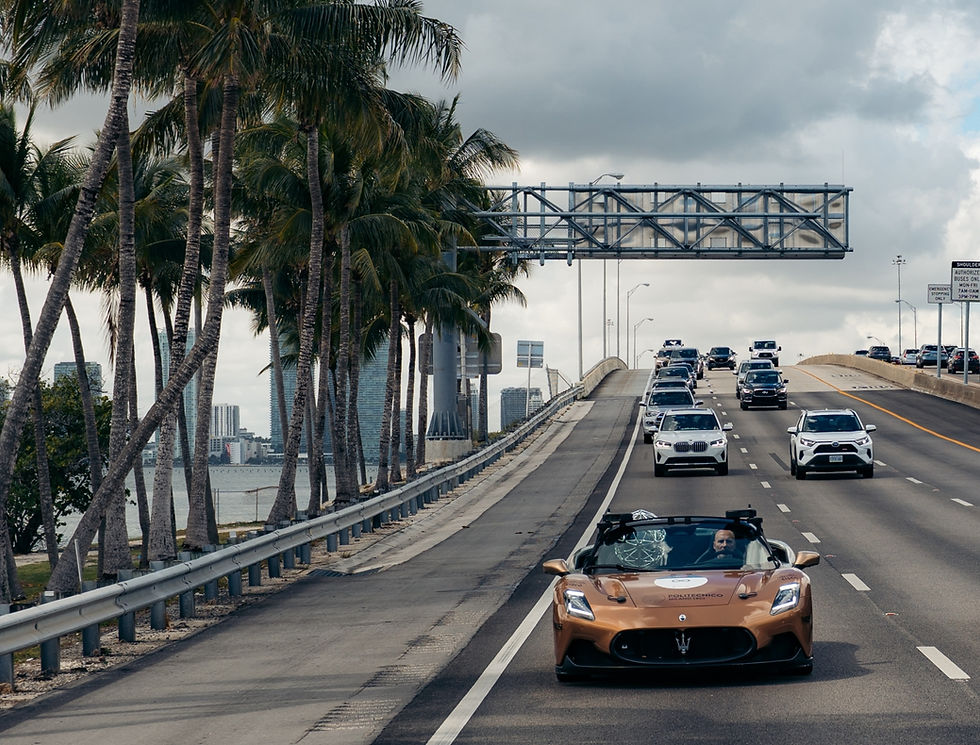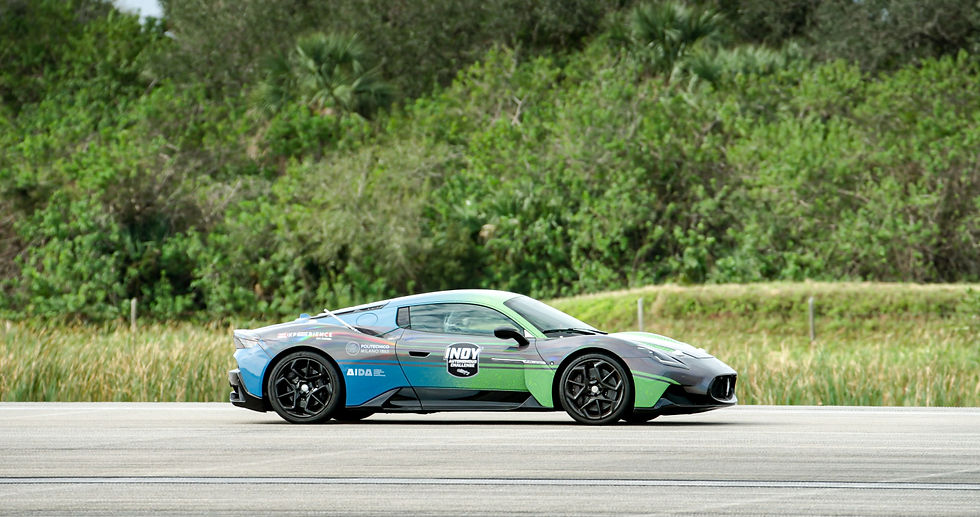Maserati MC20 Sets High-Speed Autonomous Driving World Record At Kennedy Space Centre
- Natalia Sousa
- Mar 3
- 4 min read
The Indy Autonomous Challenge (IAC) is reshaping the landscape of high-speed autonomous driving. Recent collaborations with the Politecnico di Milano, Maserati, and the 1000 Miglia Experience Florida have culminated in a remarkable event at the Kennedy Space Center in Cape Canaveral, Florida. This initiative, a part of MOST – Italy’s National Center for Sustainable Mobility, reflects a solid commitment to innovating sustainable practices in the automotive industry.
The event took place at the Space Florida Launch and Landing Facility (LLF), known for having one of the longest runways in the world at 15,000 feet (2.8 miles). This site, famous for being a landing ground for NASA’s Space Shuttle missions, provided a fitting backdrop for groundbreaking automotive achievements aimed at setting new records in autonomous driving.

The highlight of this initiative was the incredible achievement of the Maserati MC20 Coupé, which reached an astonishing speed of 197.7 mph (318 km/h) without a driver behind the wheel. This shattered the prior record of 192.8 mph established by the IAC and PoliMOVE in April 2022. The Maserati MC20 Coupé showcases how motorsport can act as a proving ground for cutting-edge autonomous technologies.
“These world speed records are much more than just a showcase of future technology; we are pushing AI-driver software and robotics hardware to the absolute edge. Doing so with a streetcar is helping transition the learnings of autonomous racing to enable safe, secure, sustainable, high-speed autonomous mobility on highways”, said Paul Mitchell, CEO of Indy Autonomous Challenge and Aidoptation BV.
This vehicle had already made headlines by becoming the fastest autonomous production car, clocking in at 177 mph (285 km/h) during trials at Piacenza Military Airport in November 2024. Its latest run at Kennedy Space Center elevates expectations for what autonomous vehicles can accomplish, emphasizing that innovations in racing can translate into practical benefits for everyday driving.

Central to this record-setting achievement is the advanced AI driver software created by the researchers at Politecnico di Milano. This powerful technology allows the car to make quick decisions based on real-time data in a fast-paced environment. The AI's capability to analyze extensive data sets while maneuvering at high speeds exemplifies significant progress in machine learning and algorithm development.
The collaboration among IAC, Politecnico di Milano, and industry partners illustrates the critical role of teamwork in advancing autonomous technologies. Programming a vehicle to navigate high-speed scenarios involves intricate complexities and safety measures, highlighting the precision and expertise required in this fast-evolving field.
“The goal of high-speed tests is to evaluate the behavior of robo-drivers in extreme conditions. These AI systems have been tested in production vehicles at legal road speeds in the Indy Autonomous Challenge races since 2021. The AIDA team used this test to push the boundaries of autonomous driving, improving safety and reliability. Conducted in controlled environments without a human driver, the test assesses the AI's stability, robustness, and reaction time, ultimately enhancing safety for low-speed urban mobility situations”, explains the Scientific Director of the project and Director of the Department of Electronics, Information, and Bioengineering at the Politecnico di Milano, Prof. Sergio Matteo Savaresi.
The developments in high-speed autonomous racing hold significant promise beyond the racing world. Technologies refined from these initiatives can lead to safer and more efficient transportation systems. For instance, advancements resulting from the IAC’s challenges could improve everyday driving by enhancing features like obstacle detection, navigation under different conditions, and collision avoidance.
As urban centers globally strive for sustainability, technologies born from such high-speed tests indicate a favorable future where autonomous vehicles contribute to reduced emissions and improved mobility. Understanding how vehicles perform at significant speeds will be crucial in designing commercial self-driving cars.
The Importance of Collaboration - Future of Autonomous Driving
This project underscores the importance of collaboration between academia and industry. The fusion of Maserati's automotive engineering prowess and the Politecnico di Milano’s educational excellence creates a nurturing environment for innovation. These partnerships are vital as the race towards expanding autonomous driving capabilities continues.
Additionally, events like the 1000 Miglia Experience Florida serve as excellent platforms for showcasing advancements while fostering public interest. The combination of high-speed motorsport and cutting-edge technology engages audiences, educating them about how the future of transportation will unfold.
“The 1000 Miglia has never been just a race; it is a journey through history, a symbol of innovation, and a tribute to Italian automotive excellence. The synergy between the 1000 Miglia Experience Florida and the groundbreaking autonomous driving technologies developed by the Politecnico di Milano represents an extraordinary step forward in the future of mobility. Seeing a Maserati MC20—an icon of Italian design and performance—pushing the limits with artificial intelligence is proof that tradition and future can coexist. This first edition in Florida marks the beginning of a new chapter for the 1000 Miglia, bridging the gap between heritage and the frontiers of innovation.”, commented Massimo Cicatiello, President of EGA USA, the organizer of 1000 Miglia Experience Florida.
The Road Ahead
The collaboration between the Indy Autonomous Challenge and Politecnico di Milano at the Kennedy Space Center stands as a major milestone in autonomous driving. The Maserati MC20 Coupé’s record-setting speed of 197.7 mph proves what can be accomplished with the right mix of innovative technology and dedicated talent.
As the automotive industry evolves, the lessons learned from such initiatives will significantly impact the broader field of autonomous vehicle development. This progress will pave the way for safer, more efficient, and sustainable mobility solutions, emphasizing the value of research and cooperation in reaching the automotive goals outlined by global stakeholders.
Kommentare